Click on images to enlarge
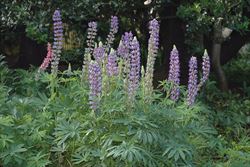
habit (Photo: Rob and Fiona Richardson)

habit (Photo: Greg Jordan)
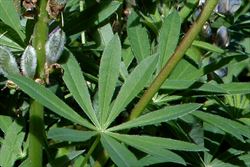
stems and leaves (Photo: Rob and Fiona Richardson)

elongated flower clusters (Photo: Rob and Fiona Richardson)
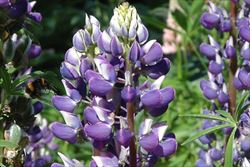
flowers (Photo: Rob and Fiona Richardson)
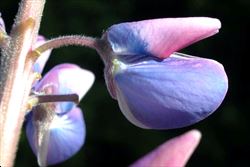
close-up of pea-shaped flower (Photo: Greg Jordan)
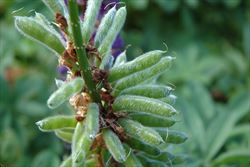
immature fruit (Photo: Rob and Fiona Richardson)

close-up of hairy immature fruit (Photo: Greg Jordan)
Scientific Name
Lupinus polyphyllus Lindl.
Synonyms
Lupinus 'Russell Hybrid' (misapplied)
Family
Fabaceae (Queensland, the ACT, Victoria, Tasmania, and the Northern Territory)
Fabaceae: sub-family Faboideae (New South Wales)
Leguminosae (South Australia)
Papilionaceae (Western Australia)
Common Names
bigleaf lupine, common lupine, garden lupin, large-leaf lupin, large-leaved lupin, lupin, marsh lupine, Russell lupin, streamside lupine, Washington lupin
Origin
Native to the temperate regions of North America (i.e. Alaska, western Canada and western USA).
Naturalised Distribution
Naturalised in the cooler temperate regions of south-eastern Australia (i.e. in the southern tablelands region of New South Wales and the highland regions of north-eastern Victoria). Also sparingly naturalised in south-eastern South Australia and possibly naturalised in Tasmania.
Naturalised overseas in eastern Canada, Europe (i.e. Denmark, Finland, Norway, Sweden, Germany, Poland, Estonia, Latvia, Lithuania and western Russia) and New Zealand.
Notes
Russell lupin (Lupinus polyphyllus) is regarded as an environmental weed in Victoria and as a potential environmental weed or "sleeper weed" in other parts of southern Australia. This species is becoming widespread throughout the alpine regions of Victoria and New South Wales, from Falls Creek to Kosciuszko National Park and Cabramurra. It is particularly common in the Snowy Mountains area in southern New South Wales.
Russell lupin (Lupinus polyphyllus) is very widespread on the South Island of New Zealand and was recently added to the Global Invasive Species Database. It has the potential to become a weed of river beds and riparian habitats in the cooler temperate and alpine areas of Victoria, New South Wales and Tasmania.
Note: Though Lupinus polyphyllus is usually called by the common name "Russell lupin" it is actually a different plant than the true Russell lupin (i.e. Lupinus x regalis), which is a horticultural hybrid involving Lupinus arboreus and Lupinus polyphyllus. This cultivated hybrid differs by having rather dense clusters of flowers in a wider range of colours (i.e. yellow, orange and red as well as blue, purple, pink, white).

